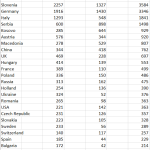July 7, 2013 — A clearly-disturbed son of Croatian parents left his birthplace of New York City and landed in Split today, promising to try his best in the European Union’s newest member.
We wish him the best of luck. He’ll need it.
“Welcome to Europe!” my friend Elena said. It was a sardonic greeting common in the days when Croatia experienced a brief, nation-wide climax after entering the European Union.
I’d landed in her hometown of Split after a 16-hour jaunt from JFK, NYC, needing to kill time during a three-hour layover. Elena was, for all intents and purposes, a familiar face and soon-to-be recogizable chef volunteering to be a nation’s de facto welcoming committee.
Elena immediately broke the spell by asking a question I’ve been fielding for the last five years.
“Reci mi, jesi li ti lud?” she blurted out in her Split dialect, where the vowels last long a beat too long. Not a bad question, though.
“Are you crazy?” I couldn’t answer. Still can’t.
Fast-forward three hours, I hop aboard the bus to Zadar, which’ll lead to a ferry ride to my home on the island of Iž.
The bus driver flipped the radio stations and on comes Jinx’s “By By Baby By,” a throw-away Croatian pop tune which seemed a little too accurate for the moment. Its refrain loosely translates to “Everything’s ruined.”
Indeed.
Exactly five years passed since I entered Europe, told I’ve gone mad then serenaded to an apocalyptic pop song.
Am I crazy?
Is everything ruined?
Well, not quite. Not yet.
In the time I’ve spent in Croatia proper and specifically on Iž, I learned a thing or two. Or five.
Bura ain’t shit
This was one of the bigger bugaboos among the locals.
“Oh sure, you love the summer,” they said. “Everyone does. But wait until winter, when the Bura starts blowing.”
A daft thing to tell a guy from the Northeastern United States who endured 28 years of blizzards and hurricanes. Do I need to be wary of a Northeasterly wind swooping in from the Velebit Mountains?
A faux Bura no less. It hits Iž from an awkward angle because the neighboring island Ulgjan blocks the worst of it.
Still, I brought my ski jacket, thick gloves and scarf, expecting something akin to the weeks-long deep freezes too common in New York City.
Then finally, the bura hit right after New Years. I got a text message warning me to bundle up. I heard the low hum of the steady wind against my door. My first Real Bura.
I layered up for my average winter day: a thermal undershirt, hoodie, polar fleece, a beanie, wool socks and boots, then buried my snout into the lapel of my red, well-worn windbreaker jacket and stepped outside.
I was sweating within five minutes.
This perverse fear of the Bura has become a favorite counter to any arguments I hear about Croats’ toughness. Bura ain’t shit.
Your privacy is meaningless
I spent months listening to the many reasons I’d hate living on Iž. One point kept reemerging: “It’s a tiny village. Everyone will be in your business. They’re all nosy.”
“I want people to be in my business,” I replied.
“But they’ll make up lies about you.”
“Great!”
Throughout life, I’d called dozens of anonymous faces my “neighbors.” I never actually blessed any of them with a name, or bothered to learn their real one.
Instead, New Yorkers refer to each other by gender-specific nouns with at least one identifying characteristic.
For example: “the girl upstairs with the dog,” who was dating “the Greek guy up the block who has a fat sister with the black hair.” (There were many Greek guys on our block, only three had heavier sisters, but only one of them had black hair.)
“The bald guy with the glasses on the third floor”, for example, was a real person to me who lived in my building. In the four years, I accosted him every morning in the hallway, I never bothered to find out his actual name.
This was my community, as I understood it.
As predicted, Iž’s chorus of old women sitting on benches has played a game of broken telephone with my personal history.
In the last five years, I have allegedly: abandon a half-black child in New York City to avoid alimony payments; impregnated my now-wife at least three times; gone bankrupt; committed of bevy of sins too heinous to list.
I wish it were all true. A lover of fiction couldn’t have dreamt of a more interesting life.
Despite the back-biting and chatter, my relationships with the locals — my neighbors — couldn’t be better. I’ve adopted good faith policy of “Lie about me and I’ll be honest to you,” in which I tell only the boldest truths to the peanut gallery. (This policy tends to backfire when one has spent all morning on the toilet and then someone asks, “How are you?”)
I also do my best to call everyone by their name, regardless of their siblings’ size.
Fair-weather friends abound
Ah yes, summer. The time of year when the Dalmatian coast’s fair-weather friends arrive in droves and point at all the flaws. On Iž, the syndrome is legion.
This island’s few full-time residents will endure a summer-long a barrage of empty-headed, impractical ideas so asinine we can’t believe a functioning human being’s mind generated them.
They all start with an “Aha!” index finger stab into the air followed by, “You what needs to be done?!”
Previous suggestions include:
- Chop down all the pine trees
- Invest in a desalinator
- Keep the olive mill running year-round
- Fix the ramshackle roads
- Find someone to weed whack the paths zig-zagging the island
- Build a funeral home (more on that later)
- Get someone to [open an impulsively-imagined business]
- Making the ferries run more often, somehow
Of course, the plural possessive noun is never used. It’s never “We need to find a way to…” Only the second-person “you”. As in “You fix this by the time we come back next year.”
These suggestions often come from well-heeled diaspora who ditched the country decades ago then built megalith houses they only visit two weeks a year. They otherwise keep their connection to Croatia alive via Facebook albums and Likes — the modern slacker’s substitute for actual investment and energy.
Of course, none appreciate the minor miracle involved in keeping the whole island functioning year round. But they’ve got an idea or two they’d like to share
I can’t attend funerals anymore
In my first year of living on this island, I saw nearly a dozen people “go to Church”, as they say here. That number has more than tripled in the last five years. Cousins, neighbors, friends… half of my father’s childhood gang of misfits. Gone.
In the same five-year period, only one child has been born. Even her place as an Iž resident is temporary.
It’s a pattern replicated around the country, yet devastating communities like this one. Because when someone dies on Iž, it’s not just one person departing. It’s one more flaying strand of a family cut loose.
Another home joining the many whose lights don’t turn on anymore.
I simply can’t go to funerals.
Within the ranks of social faux pas one commits in a small town, avoiding funerals may be the most heinous — yet most-taboo.
Who can work up the gall to ask, “Why didn’t you come [Person’s] funeral?” Yet as an able-bodied early-30s male, I know my absence resonates most when the casket needs to lowering the grave. Still, I won’t go.
Cynicism is the exception
Treat Croatia’s media — this site included — as a satellite photograph of the nation and you’d think everything’s ruined.
Demographic collapses, confounding politicians, football controversies, caps-lock BUREAUCRACY rants, government-engineered soft landings for bankrupt companies… these all combine to form a bleak picture of a pseudo-banana republic.
Cynicism left unchecked can spread like a cancer which targets every idealistic soul until it chokes out all hope.
Yet on a daily basis, I don’t encounter raging cynics. Just disappointed idealists.
As TCN and other sites have shown, there’s reason for hope. Whether it be the stubborn entrepreneur mastering the bureaucratic maze, or local activists performing unprompted miracles.
Or a lunatic from Queens itching to live in a place everyone’s fleeing
I get the sense everything isn’t ruined. Not yet.











